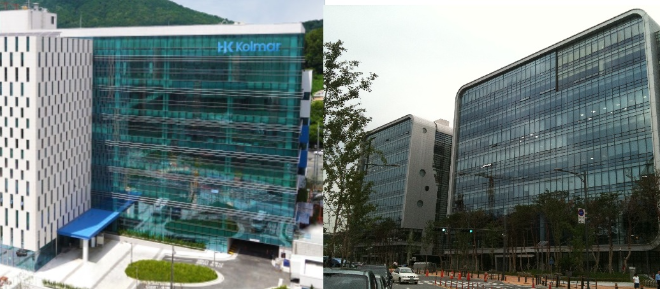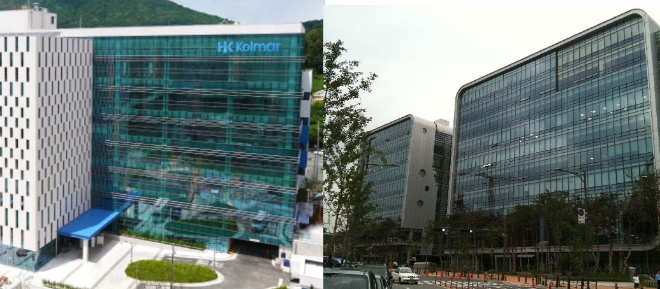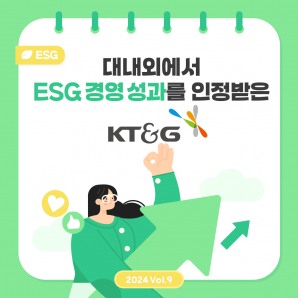According to industry sources on April 8, U.S. President Donald Trump announced on April 2 that a 25% reciprocal tariff would be imposed on all products imported from South Korea. A baseline 10% tariff has already been in effect since April 5, with the reciprocal tariff set to apply from April 9.
While fears of a "tariff bomb" ripple across industries, Kolmar Korea and COSMAX appear largely shielded. Analysts suggest the tariff policy could even create opportunities for these ODM leaders, given their accelerated localization plans and existing U.S. production infrastructure.
Kolmar Korea is nearing completion of its second U.S. factory in Pennsylvania this month, with operations expected to begin in the first half of the year. Once operational, Kolmar USA’s production capacity will expand to 300 million units annually.
COSMAX, through its U.S. subsidiary COSMAX USA, is also ramping up local production. Its New Jersey facility boasts an annual capacity exceeding 270 million units.
Industry observers anticipate positive momentum for both subsidiaries, which have long struggled with losses. In 2024, Kolmar USA reported a KRW 50.3 billion net loss, while COSMAX USA recorded a KRW 32.2 billion net loss. However, expectations are rising that the current tariff war landscape could accelerate a turnaround, as more clients outsource production to local facilities.
A Kolmar Korea representative stated, “While labor costs in the U.S. are higher, clients seeking to avoid reciprocal tariffs may increasingly turn to local production, benefiting our U.S. subsidiary.”
Production capacity also remains robust. The company asserts there will be no strain in fully manufacturing export-bound products locally, even if orders surge in the region. He added, 'Even if U.S. production volumes increase significantly, we can comfortably handle the load.'
Additionally, most K-beauty products are currently distributed through a 'reverse direct purchasing' model, where local consumers buy directly from domestic platforms. If brands were to export cosmetics directly to the U.S., they would be subject to tariffs. However, when products are sold via reverse purchasing, the tariff burden may instead fall on local consumers.
A COSMAX official explained, "K-beauty brands often rely on individual reverse direct purchasing rather than direct market entry by client companies". Under current policies, cosmetics purchased from countries other than China are generally exempt from tariffs if the transaction amount is below $800.
However, uncertainties remain. Some clients may abandon the U.S. market entirely due to tariff pressures. An industry insider noted, “The possibility of clients exiting U.S. operations remains a variable. Clear impacts will likely emerge after Q2 2025.”
Meanwhile, K-beauty claimed 22.4% of the U.S. cosmetics import market in 2024, surpassing France to take the top spot. Exports reached an all-time high of $1.9 billion (approximately KRW 2.7981 trillion).
Kim Nayoung, Korea Finacial Times (steaming@fntimes.com)





























![톱25 증권사 여성이사 ‘미풍’…사외이사 10% 그쳐 [사외이사 줌人 (2)]](https://cfnimage.commutil.kr/phpwas/restmb_setimgmake.php?pp=006&w=69&h=45&m=5&simg=2025041222515809106dd55077bc25812315232.jpg&nmt=18)


![흥국생명·화재, 여성 ‘제로’…중소형 보험사 이사 다양성 미흡 [사외이사 줌人 (2)]](https://cfnimage.commutil.kr/phpwas/restmb_setimgmake.php?pp=006&w=69&h=45&m=5&simg=2025041307412406750dd55077bc25812315232.jpg&nmt=18)
![LB인베스트먼트, AI·딥테크 등 유망기업 1500억원 이상 투자 도모 [2025년 VC 전략지도]](https://cfnimage.commutil.kr/phpwas/restmb_setimgmake.php?pp=006&w=69&h=45&m=5&simg=2025041307542506596dd55077bc25812315232.jpg&nmt=18)

![인카금융서비스, 설계사 1만명 영입·매출액 1조2000억원 목표 [GA 2025년 주요 사업전략]](https://cfnimage.commutil.kr/phpwas/restmb_setimgmake.php?pp=006&w=69&h=45&m=5&simg=2025041307384807523dd55077bc25812315232.jpg&nmt=18)


![크래프톤, 대표는 ‘연봉킹’ vs 주주들은 ‘손해’ [정답은 TSR]](https://cfnimage.commutil.kr/phpwas/restmb_setimgmake.php?pp=006&w=69&h=45&m=5&simg=2025041309205204198dd55077bc25812315232.jpg&nmt=18)












![[카드뉴스] 신생아 특례 대출 조건, 한도, 금리, 신청방법 등 총정리...연 1%대, 최대 5억](https://cfnimage.commutil.kr/phpwas/restmb_setimgmake.php?pp=006&w=298&h=298&m=1&simg=20240131105228940de68fcbb35175114235199_0.jpg&nmt=18)
![[카드뉴스] KT&G ‘Global Jr. Committee’, 조직문화 혁신 방안 제언](https://cfnimage.commutil.kr/phpwas/restmb_setimgmake.php?pp=006&w=298&h=298&m=1&simg=202503261121571288de68fcbb3512411124362_0.png&nmt=18)


![[카드뉴스] 국립생태원과 함께 환경보호 활동 강화하는 KT&G](https://cfnimage.commutil.kr/phpwas/restmb_setimgmake.php?pp=006&w=298&h=298&m=1&simg=202403221529138957c1c16452b0175114235199_0.png&nmt=18)
![[신간] 리빌딩 코리아 - 피크 코리아 극복을 위한 생산성 주도 성장 전략](https://cfnimage.commutil.kr/phpwas/restmb_setimgmake.php?pp=006&w=81&h=123&m=5&simg=2025032814555807705f8caa4a5ce12411124362.jpg&nmt=18)
![[신간] 지속 가능 경영, 보고와 검증](https://cfnimage.commutil.kr/phpwas/restmb_setimgmake.php?pp=006&w=81&h=123&m=5&simg=2025011710043006774f8caa4a5ce12411124362.jpg&nmt=18)
![[서평] 추세 매매의 대가들...추세추종 투자전략의 대가 14인 인터뷰](https://cfnimage.commutil.kr/phpwas/restmb_setimgmake.php?pp=006&w=81&h=123&m=5&simg=2023102410444004986c1c16452b0175114235199.jpg&nmt=18)

![[신간] 똑똑한 금융생활...건전한 투자와 건강한 재무설계 지침서](https://cfnimage.commutil.kr/phpwas/restmb_setimgmake.php?pp=006&w=81&h=123&m=5&simg=2025031015443705043c1c16452b012411124362.jpg&nmt=18)

![[카드뉴스] KT&G ‘Global Jr. Committee’, 조직문화 혁신 방안 제언](https://cfnimage.commutil.kr/phpwas/restmb_setimgmake.php?pp=006&w=89&h=45&m=1&simg=202503261121571288de68fcbb3512411124362_0.png&nmt=18)
![[AD] 기아, 혁신적 콤팩트 SUV ‘시로스’ 세계 최초 공개](https://cfnimage.commutil.kr/phpwas/restmb_setimgmake.php?pp=006&w=89&h=45&m=1&simg=2024123113461807771f9c516e42f12411124362.jpg&nmt=18)
![[AD] 아이오닉5 '최고 고도차 주행 전기차' 기네스북 올랐다...압도적 전기차 입증](https://cfnimage.commutil.kr/phpwas/restmb_setimgmake.php?pp=006&w=89&h=45&m=1&simg=2024123113204707739f9c516e42f12411124362.jpg&nmt=18)




